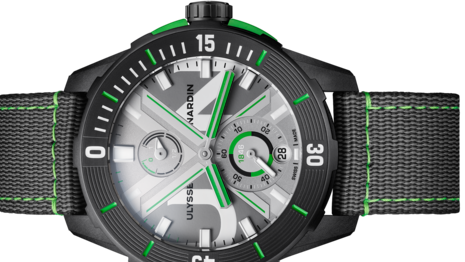 The Diver Net concept watch is the latest way Ulysse Nardin is supporting ocean conservation efforts. Image credit: Ulysse Nardin
The Diver Net concept watch is the latest way Ulysse Nardin is supporting ocean conservation efforts. Image credit: Ulysse Nardin
Swiss watchmaker Ulysse Nardin is using recycled fishing nets to construct a concept watch as part of its commitment to a sustainable environment.
The watchmaker has fabricated the case, middle, back and bezel decoration of its new Diver Net from the plastic material of discarded fishing nets thanks to a partnership with a French recycling group Fil & Fab. The move underlines the diving watch specialist’s commitment to ocean conservancy and adds a sense of adventure and authenticity to its brand.
“Using recycled materials and highlighting an environmental issue is a positive step for the brand,” said Donnie Pacheco, founder of Donnie P. Consulting, Seattle. “This partnership is a way to get their brand in front of customers who might not have previously been exposed to it or aware of the brand, so it is a good attempt to branch out.”
An aquatic concept
Though not yet ready for commercial production, the Diver Net is the latest entry into the watchmaker’s collection of diver’s watches. On top of its other eco-advances, the watch’s strap is woven from PET plastic bottles found in the sea by the Swiss company Tide.
The brand’s UN-118 automatic movement is the engine behind the watch, which boasts water resistance of 300 meters and a 60-hour power reserve. The black and grey watch is presented with various green touches to symbolize nature and its closeness to the sea.
 The Ulysse Nardin Diver Net is made from recycled fishing nets. Image credit: Ulysse Nardin
The Ulysse Nardin Diver Net is made from recycled fishing nets. Image credit: Ulysse Nardin
Another striking feature is its transparent ceramic glass covering, manufactured in the Swiss canton of Jura, which has less of an environmental impact than traditional sapphire glass.
Named after its founder, the Kering-owned watchmaker has developed an extensive line of marine watches and deck chronometers “inspired by the sea,” making its use of recycled fishing nets a natural fit.
“Our intention is not to be the first to innovate with sustainable materials, but rather to show the watch industry that it is possible to make our customers aware of recycled materials, even for luxury items,” said Patrick Pruniaux, chief executive officer of Ulysse Nardin, in a statement. “We would be very happy if our innovations were somehow ‘open source’.”
Lasting less than five minutes, a short film explores Ulysse Nardin’s relationship with Fil & Fab, the group of Bretons who came up with the idea of using the polyamide pellets created from recycled fishing nets as raw materials.
The plastic from recycled commercial fishing nets is prized for its strength.
Fil & Fab’s objective is to recycle the 800 metric tons of fishing nets that are disposed of every year in France.
“It may seem like a lot, but it’s nothing compared to the 640,000 metric tons of netting lost at sea every year,” says the narrator in French.
Fil & Fab is the first French recycling company to treat fishing nets and the brainchild of its three founders who were inspired to take action after staring at used fishing nets at the port of Brest in Brittany.
“We just asked ourselves if something was being done and decided to create Fil & Fab,” the narrator says. “We have to become proactive no matter what.”
The unusable fishing nets are placed in harbor dumpsters by fishermen and then taken to Fil & Fab’s recycling shed for sorting by color, quality and their port of origin. Only the polyamide threads are kept and they are cleaned and crushed before being granulated.
The plastic that results is prized for its high-tensile strength and resistance to friction.
Upcycling trends
Upcycling or the repurposing of recycled goods is in vogue across luxury.
Last year, Italian fashion label Prada took an inventive approach to upcycling by introducing a handbag line made out of regenerated materials, while also examining problems and solutions in the fashion supply chain through a documentary series (see story).
Italian fashion label Gucci will also continue to expand upcycling of its leather and textile waste as part of its sustainability strategy.
Additionally, Gucci will opt for recycled gold, silver and palladium for its accessories and jewelry in a bid to reduce mining and extraction impacts. Using organic fibers and sustainable alternative raw materials will also help Gucci reduce carbon emissions (see story).
In the watch space, U.S. fashion giant Tom Ford will soon launch the world’s first high-end timepiece made completely from ocean plastic.
The Tom Ford Ocean Plastic Timepiece will debut in November, made in partnership with suppliers who are similarly focused on the global plastic waste issue. Buying the Swiss-made watch removes the equivalent of 35 bottles of plastic waste from the ocean (see story).
However, luxury brands should be strategic in how they incorporate their upcycling and sustainability efforts into their marketing.
“This partnership and campaign are not fully integrated throughout the brand messaging,” Mr. Pacheco said. “This partnership is not highlighted on the Ulysse Nardin website and a search for Fil & Fab does not return any results.”